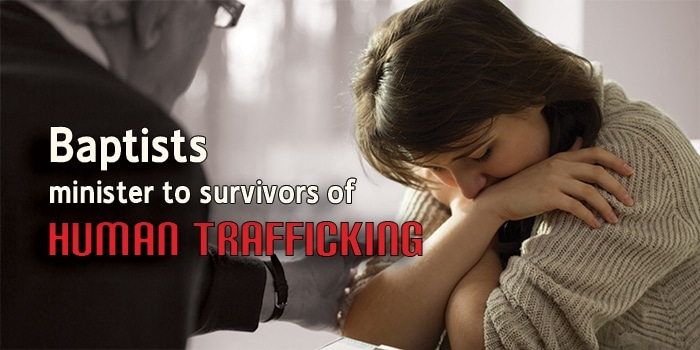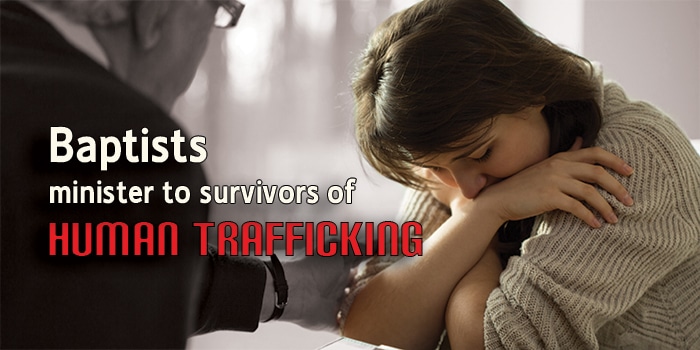
Although sometimes portrayed as a problem found in other nations, human trafficking also occurs in large numbers in the United States. The FBI includes St. Louis as one of the top 20 trafficking cities in the U.S., and governmental groups have also identified Kansas City as a trafficking hub. In addition to efforts to prevent trafficking and prosecute those responsible, Baptists see a need for ministry to survivors of trafficking.
 Rodney Hammer, executive director of missions for Blue River-Kansas City Baptist Association (BRKC), is passionate about Christians working to stop human trafficking and minister to its victims.
Rodney Hammer, executive director of missions for Blue River-Kansas City Baptist Association (BRKC), is passionate about Christians working to stop human trafficking and minister to its victims.
Hammer, who spent 18 years serving through the International Mission Board in China and Southeast Asia and in Central and Eastern Europe, said he “first saw the problem and heard about the problem overseas” so it “was already on my heart” when moving to Kansas City. At first, though, he “didn’t realize we had such a huge domestic trafficking problem.”
“I began to become more aware of the problem here locally as I moved around our association and looked at the community-wide problems that missionally we can prayerfully work on,” he added. “It was when I began to hear personal stories and real examples of the devastation of what’s happening so pervasively right under our noses.”
Hammer noted “now people order sex with a child like they order a pizza” by simply going online, picking what they want and then waiting for the delivery.
“It’s disgusting; it’s horrific,” he responded. “It’s also very motivating.”
With that motivation, the BRKC in May of 2015 launched a new ministry to help survivors of trafficking.
The Restoration House of Greater Kansas City seeks to fill “a gap for residential services.” They offer 24-hour care, trauma and addiction counseling, educational classes and life skills training. Already they have served 16 young women. Hammer said they “offer a long-term, holistic, Christ-centered program of recovery.”
“Our goal is to offer an opportunity for hope, for healing, for restoration,” he explained. “We’ll take anybody, all kinds of folks who’ve had their lives stolen from them.”
“We don’t force it but we’ll offer anyone the healing of Christ,” he added. “Our goal is to see a gospel transformation.”
What churches can do
Sandra Johnson, a North American Mission Board Mission Service Corps missionary, founded the Triad Ladder of Hope in North Carolina “dedicated to eradicating the exploitation, sale and enslavement of men, women and children.”
Johnson explained they focus on “awareness, rescue, restoration and re-entry.” The latter three areas involve helping bring people out of trafficking situations, providing them with a safe place for counseling and creating “a safe and healthy environment for survivors to rebuild their lives.”
The area of awareness includes “educating community, churches, professional, youth, schools and civic groups on what human trafficking is, how to recognize it and what to do.”
“There is so much churches can be and should be doing,” she added.
Johnson offered several ways churches can join the fight against human trafficking: pray, “address pornography with their members” since “pornography is a growing problem in our churches and feeds sex trafficking” and provide financial and volunteer support to local organizations like Triad Ladder of Hope. She also urges churches to “host a community training so members know what to watch for and what to do.”
Despite the challenges, especially in securing financial support and finding housing for victims, she remains hopeful as she recalls the ministry’s successes.
“The last 10 years have been an amazing walk with God for our team,” Johnson said. “We praised God as he answered prayer and gave us some amazing God moments.”
Hammer also urges churches to take actions to fight human trafficking. In particular, he thinks churches need to educate youth and others on the risks of trafficking. He encourages churches to hold separate sessions for youth and parents to help people recognize the signs of “grooming” used by traffickers to “lure” someone in and traffic them.
“Be educated, be informed, be aware and be prepared,” he said. “Become aware of what’s happening, why it happens and how to help young people and others avoid being lured into being trafficking.”
“If you see something, say something,” he added. “Educate yourself on signs to look for and then if you see something that looks suspicious in terms of trafficking, you call [the National Human Trafficking Resource Center] hotline.”
Hammer and Johnson both encourage the use of a national hotline (888-3737-888) to report possible trafficking victims or perpetrators. The hotline’s website, TraffickingResourceCenter.org, also provides numerous resources.
Hammer hopes churches will help make members and others in the community more aware of the problem and assist organizations working to prevent trafficking, rescue those trafficked and minister to the survivors. A key starting point, he explained, is learning about human trafficking.
“If you don’t know, you can’t do anything about it,” he explained. “Do something to be part of combating this.”


